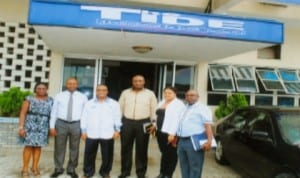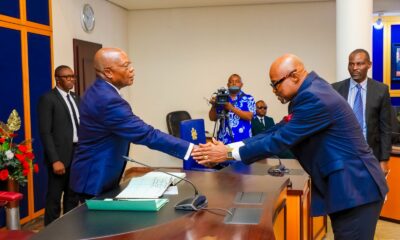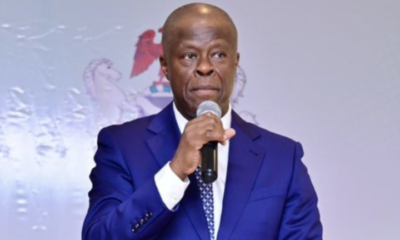News
New Rivers Police Boss Assures Of Neutrality …Amaechi Calls For Professionalism

General Manager, Rivers State Newspaper Corporation, Mr Celestine Ogolo, (3rd left) in a group photograph with the Exco of Nigeria Hotels Association, Rivers State chapter, during their official visit to the corporation recently. Photo: Obinna Prince Dele
Newly posted Commissioner of Police to Rivers State, Mr Dan Bature has said he will ensure a fair playing ground for all parties and improved security in the state.
He gave the assurance when he paid a courtesy call to Governor Chibuike Amaechi, yesterday in Government House, Port Harcourt.
He said, “We are aware of the developments generally in the country. We want to assure His Excellency that, we will do all that it takes to ensure the situation gets better than the way everybody enjoys security in the state. Once more, I thank you”, Bature said.
“The Nigerian Police alongside other sister agencies are responsible for internal security in Nigeria. Therefore, I am fully aware that, the tasks of ensuring adequate security and the challenges associated with it are our responsibility. My boss (Ogunsakin) has fully briefed me on his achievements in the past few months. And, these successes are unconnected with cordial relationship he had enjoyed with the Rivers State Government and the good people of Rivers State. It is a challenge that we have to sustain if we want to carry the state to the next level in terms of policing to ensure adequate protection of lives and property in Rivers State”, he further stated.
He however called for the subsisting co-operation between the Rivers State Government and the police to be sustained.
Meanwhile, Governor Amaechi has implored Bature to display professionalism to earn the respect and support of government and people of the state.
Amaechi said while welcoming the new State Police boss, “If you keep to social justice, believe me, you will be the friend of everybody. The Rivers State Government will continue to support you, once that is kept. But, if it is not kept, you can ask Mbu to confirm that, when we found out that, he was a card carrying member of PDP, we stopped funding the police. And they were not too happy. But, we will fund the Nigerian Police if you continue to maintain your responsibility”, Amaechi said.
The Chairman of Nigeria Governors Forum (NGF), who recalled the antecedents of former Police Commissioner in the state, Mbu Joseph Mbu said he was a politician in police uniform who attempted to cripple the economy of the state.
Amaechi said, the former police boss deviated from his professional role of protecting lives and properties by serving politicians of the Peoples Democratic Party(PDP).
According to him, “Unlike Mbu Joseph Mbu, who clearly showed us that, he was a registered member of PDP. In your own case, (Ogunsakin) you know that, we had disagreement, but, you realized your responsibility to ensure the security of lives and property as the paramount responsibility of the Nigerian Police. It is important you keep that peace. And I wish to thank you for that peace. I am also sure, Rivers people are happy about that. And the way Mbu was going, Rivers economy would have collapsed completely. Fortunately for us, they took him away and brought you (Ogunskin) and you restored calm. You tried to create a platform for all parties to have access to reach you. And as you go, please, go with that same spirit. The Police in Rivers State, should discharge their responsibility as it concerns the protection of lives and property”.
“Let me welcome the new commissioner of Police and say that, if the Federal Government refuses, I will repeat what I said, when I was sworn in as Governor in 2007. I said, if the Federal Government refuses to provide legitimate source of livelihood for Nigerians in our state, Nigerians will provide for themselves illegitimate source of livelihood. And that, includes kidnapping, robbery, stealing by people who will hire or provide police or military uniforms. And that illegitimate source of livelihood becomes its own economy which automatically frightens the legitimate economy”, he said.
The State Chief Executive also advised the new commissioner of Police, Dan Bature to ensure social justice rather than partisan politics, warning that, the absence of social justice may breed resistance and breakdown of law and order in the state.
“Now in the same manner, when it comes to security, as a former student leader, I understand that, immediately, the police become partisan in politics and does not provide security for everybody, other parties will be compelled to provide security for themselves. I know this as a politician since 1987 when I joined politics. And, one thing about security is that, it is cash based. They will provide for themselves the means with which to protect themselves.
“The Nigeria Police is supposed to mingle and have the confidence of the Nigerian people. But, the moment, it becomes the agent of the other party, then, you are no longer the Nigerian Police. You automatically lose that title. You are coming into a situation where, the right thing must be done according to social justice, the absence of it, is what breeds crime and resistance. The only thing we ask you is social justice. If you ask any of the commissioners of police who had served in Rivers State, I have never requested for favours, because, I don’t have the need for it. We believe in law and order. But, when you don’t keep law and order, what you are inviting and get is resistance.”
Earlier, the out-going Police commissioner, and newly promoted Assistant Inspector General of Police, AIG, Tunde Ogunsakin said, he had discharged his duties as a professional police officer since he assumed office on 12th February, 2014 in Rivers State.
According to him, “the task has been onerous as a result of the various contending interests in the political, economic as well as other facets of human endeavors that we had to grapple with. In the area of crime prevention, we have been very proactive and have put in place adequate measures to ensure that crime is brought to the minimum. We embarked on intensive patrols of all nooks and crannies with a view to ensuring that criminals are not allowed to thrive in any part of the state. On crime fighting, I strategically marshaled a formidable operational plan that speedily responds to distress calls to all forms of criminalities, particularly violent crimes of armed robbery, kidnapping and cultism in the state.
Ogunsakin also commended Governor Amaechi for the co-operation rendered by his administration.
“I want to thank His Excellency, Rt. Hon. Chibuike Rotimi Amaechi for the hand of fellowship extended to me while I remained at the helm of affairs of the Rivers State Police Command. There may have been areas of conflicts but, these were eventually resolved in the interest of the security of the state”, Ogunsakin explained.
News
Tinubu Appoints Four Nominees Into NCDMB Governing Council

President Bola Tinubu has approved the nomination of four new members to the Governing Council of the Nigerian Content Development and Monitoring Board (NCDMB).
The Special Adviser to the President on Information and Strategy, Bayo Onanuga, in a statement yesterday, said the appointment is to fill existing vacancies and strengthen the board’s capacity.
The statement said the approved nominees are Mr. Olusegun Omosehin of the National Insurance Commission and Engr. Wole Ogunsanya of the Petroleum Technology Association of Nigeria.
Tinubu also endorsed the nomination of Sam Onyechi, who represents the Nigerian Content Consultative Forum and Barrister Owei Oyanbo from the Ministry of Petroleum Resources.
The President encouraged the new members to leverage their expertise and dedication to enhance local content development within Nigeria’s oil and gas industry.
It added, “The nominations arose from the exit of previous institutional representatives from the Governing Council.
“The NCDMB Governing Council, established under Section 69 of the Nigerian Oil and Gas Industry Content Development Act, 2010, comprises representatives from key institutions.
“These include the Ministry of Petroleum Resources, the Nigerian Upstream Petroleum Regulatory Commission, the Nigerian National Petroleum Company Limited, the Petroleum Technology Association of Nigeria, the Council for the Regulation of Engineering in Nigeria, the Nigerian Content Consultative Forum, and the National Insurance Commission.”
News
NDDC To Construct Hostels, Roads In UNIPORT – Ogbuku

The Niger Delta Development Commission (NDDC) has announced plans to construct additional hostels, rehabilitate roads, and enhance power supply in the University of Port Harcourt (UNIPORT).
NDDC’s Managing Director, Dr Samuel Ogbuku, disclosed this during a visit to the commission’s headquarters in Port Harcourt, yesterday by a delegation from the UNIPORT’s Governing Council.
Ogbuku stated that the NDDC had committed to upgrading facilities at UNIPORT as part of efforts to foster partnership with educational institutions across the Niger Delta.
According to him, the implementation of additional projects at the university forms part of a broader strategy to improve education standards in the region.
“Aside from the construction of new hostel blocks and installation of a 300 KVA solar inverter system, the NDDC will also facilitate more projects in the university.
“The commission will also deploy its engineers to assess the condition of UNIPORT’s roads and hostels for potential rehabilitation,” he said.
Ogbuku noted that upon completion, the projects would add to various initiatives previously undertaken by the commission at the university.
“These and other projects reflect our commitment to actualising President Bola Tinubu’s Renewed Hope Agenda in the Niger Delta region,” he added.
He reaffirmed the NDDC’s dedication to fostering development and strengthening partnerships across the region.
Earlier, Sen. Mao Ohuanbunwa, Chairman of UNIPORT’s Governing Council, who led the delegation commended the current leadership of the NDDC for its achievements in accelerating development in the Niger Delta.
He highlighted the university’s infrastructural challenges, noting that it lacked adequate facilities to accommodate its growing student population, and appealed for the NDDC’s support in addressing the shortfall.
“Currently, UNIPORT has a total student population of about 50,000, while its hostel accommodation capacity can only cater for 5,000 students.
“We therefore urge the NDDC to assist in the construction of additional hostels, improve transportation facilities, and facilitate the acquisition of gas turbines to enhance power supply for our students,” Ohuanbunwa pleaded.
The Vice Chancellor of UNIPORT, Prof. Owunari Georgewill, commended NDDC for its impactful projects across the Niger Delta and extended an invitation to the commission to participate in the institution’s forthcoming 50th anniversary celebrations.
News
Senate Rejects Motion To Rename INEC Headquarters After Humphrey Nwosu

The Senate has rejected a motion to rename the Independent National Electoral Commission (INEC) headquarters after the former chairman of the defunct National Electoral Commission, late Prof Humphrey Nwosu.
Nwosu presided over the June 12, 1993, presidential election, which was truncated by the former military President, General Ibrahim Babangida (rtd).
The election which was won by the late business mogul, Chief MKO Abiola, was adjudged to be the freest and fairest in the electoral history of Nigeria.
The motion to rename INEC after Nwosu was re-sponsored by Senator Enyinnaya Abaribe yesterday after lawmakers threw it out last Wednesday.
Abaribe called for posthumous national honours to be conferred on Nwosu in recognition of his role in Nigeria’s democratic evolution.
However, the proposal sparked a heated debate once again, with lawmakers deeply divided over Nwosu’s legacy.
Senator Osita Ngwu acknowledged that Nwosu operated under a military regime, which restricted his ability to announce the results.
He argued that “there was no way he would have announced the results with a gun to his head. That doesn’t change the fact that some of us see him as a hero.”
Senator Austin Akobundu, however, described it as most uncharitable for lawmakers to dismiss Nwosu’s contributions, insisting that he deserved a place in Nigeria’s hall of honour.
On the other hand, several senators like Senator Jimoh Ibrahim dismissed the idea outright, questioning why the Senate should honour someone who failed to announce the results insisting that “nothing should be named after him”.
Senator Cyril Fasuyi argued that history does not reward efforts, but only results.
“As long as he did not announce the result, whether under duress or not, I am against naming INEC headquarters after him,” he submitted.
Also, Senator Sunday Karimi criticised Nwosu for lacking the courage to speak out, while Senator Afolabi Salisu warned that immortalising him would undermine the memory of MKO Abiola, the widely accepted winner of the June 12, 1993, annulled election.
“Any attempt to do anything beyond a one-minute silence is to rubbish Abiola’s legacy,” he tendered.
After intense deliberation, most senators rejected the motion through a voice vote.
They, however, agreed to honour him with a one-minute silence and extend condolences to his family, effectively dismissing the other prayers to immortalise Nwosu.
-
Nation2 days ago
Military Committed To Supporting Sustainable Food Security In Nigeria – CDS
-
Politics2 days ago
Anyaoku, Yakasai, Osoba, Agbakoba, Others To Meet NASS Over New Constitution
-

 News2 days ago
News2 days agoRivers HoS Resigns As Ibas Appoints New SSG
-

 Featured2 days ago
Featured2 days agoBring Your Wealth Of Experience To Governance, Ibas Tasks New SSG
-
Business2 days ago
Nigerian SME Awards: Providus, Access, Others Compete For Honor
-
Nation2 days ago
South East Caucus Kicks As Senate Rejects Nwosu’s Immortalisation
-
Business2 days ago
Stakeholders Task Govt On Efficient Rail Transport In Nigeria
-

 News2 days ago
News2 days agoNigeria’s Economy Achieving Stability – Edun

